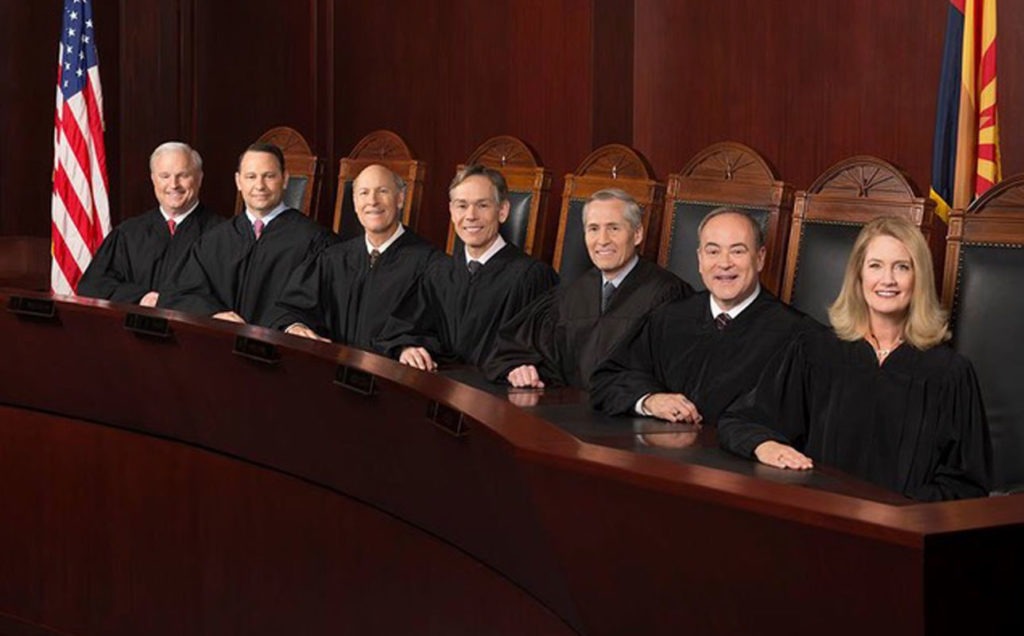By: Mikel Weisser
After months of agonizing, Arizona’s medical marijuana community finally learned the Arizona Supreme Court has agreed to hear the infamous Rodney Jones Concentrates Case, which will determine whether cannabis concentrate products are considered protected under AMMA, the Arizona Medical Marijuana Act. Expect oral arguments to begin in March, as the state awaits a final verdict for Rodney Jones and the fate of cannabis concentrate products and the future of AZ’s entire medical marijuana industry.
To recap–the Jones’ case began with a 2013 arrest of Rodney Jones, a medical marijuana patient in the Prescott area. In addition to flower, Jones also had hashish when arrested. Despite having a medical card, Yavapai County Attorney Sheila Polk, the state’s leading anti-cannabis prosecutor, charged Jones with a class 4 narcotics possession felony. Found guilty on the other charges, Jones went to prison, but appealed the guilty verdict for the hashish, citing AMMA protections. In June of 2018, nearly five years after his arrest, an appeals court upheld the narcotics conviction in a split decision. As a result, all medical cannabis products, other than dried flower, are currently deemed class four narcotics: wax, vape, ointments, even edibles–approximately 40% of the state’s market.
As the months have dragged on, AZ patients around the state, especially in rural areas, lived in fear of being harassed and arrested. Several rural dispensaries slashed their inventory, yanking concentrates off the shelves. In Chandler, patients reported being harassed outside of stores. Meanwhile cancer patient Alan Wanko made news when the stage-4 patient found himself thrown in jail for two weeks over narcotics concentrates possession following a Yavapai County traffic stop, disrupting his chemo schedule, while facing a narcotics possession charge. According to Jared Keenan, a public defender in Yavapai County, “They are going after those least able to fight back: indigent, poor, criminal defendants.”
In the wake of such tragedies, Jennifer Welton, the mother of one of AZ’s most famous concentrates patients, Zander Welton, weighed in with an impassioned editorial this month in the AZ Mirror. Welton’s son was five years old when the ACLU filed a lawsuit in 2013 to provide Zander access to cannabis oil to help him battle seizures and protect him and his parents from arrest. “No parent should ever face this devastating choice,” Welton wrote in her recent editorial, “especially after the voters of our state have expressly approved of a law to allow patients access to this important medicine.” Despite winning the civil suit, Zander Welton died in 2015. Unfortunately, since the case was a civil case, it did not provide protection for Jones or any of the dozen or so patients around the state arrested while awaiting a final resolution to the case.
With the help of the Arizona Dispensary Association, an appeal was filed in October by noted appellate lawyer, Robert Mandel. Prior to the election in Nov., state Attorney General Mark Brnovich took up the cause, then withdrew his office support for the case, citing concerns for the health of pediatric cannabis patients who need access to concentrates. This left Polk in charge of the prosecution. Polk began the year by asking the higher court to reject the case, allowing the appeals court ruling against concentrates to stand. Many worried the court would honor her request since it rejects the vast majority of appeals it receives. Instead, the court rejected Ms. Polk’s motion and set a timetable for the next steps in the case.
According to Robert Mandel, who we interviewed shortly after the decision was announced, the justices could take months to announce their final verdict. “In the meantime, I want to thank all the people who provided me with info on the case and have been so inspiring. This decision wasn’t just the result of my work. Lots of people came together to make this happen.” Mandel went on to explain that he and Polk will file their briefs in the case by Jan. 28th. Amicus briefs are due by Feb 11th. Responses to those filings will be required by the end of February, with opening oral arguments likely to begin by early March.
Learn More


